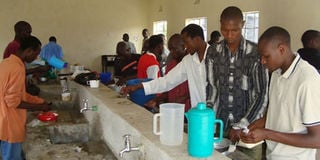Egerton kitchens give varsities food for thought

Egerton University has built kitchenettes where students can prepare their meals. The move was meant to stop students from cooking in their halls of residence. Photo/NOAH CHEPLOEN
They say the way to a man’s heart is through his stomach. Egerton University is following that route after investing in kitchenettes that enable students to prepare their food away from the halls of residence.
It is the first time students in a local university have been built kitchenettes, a clear move from the tradition where university students sleep, cook and read in their rooms. Students have been illegally tapping electricity in their rooms to prepare meals using electric coils and other gadgets.
The kitchenette idea is being hailed as other universities seek to emulate the step take by the Njoro-based institution. The university has attracted a lot of admiration for successfully striking a deal with the students. Some Sh30 million was pumped into the construction of the kitchenettes in the Njoro and Laikipia campuses.
By investing in this plan, the university was killing two birds with one stone by ensuring that cooking in the halls of residence was stopped and reducing interruption of electricity because of the abnormal power surges. But most important of all, the institution has been able to reduce the huge electricity bills.
According to Vice-Chancellor James Tuitoek, the university has been able to cut the electricity costs by Sh1.5 million per month. Last year, the institution parted with Sh102 million in electricity bills but this year it intends to reduce that amount by Sh18 million. “We’ve been able to remove the risks of fire outbreaks at the halls while reducing the electricity bills,” said Prof Tuitoek.
Interestingly, students, who normally hit the roof at the slightest provocation, have adopted this new system without a fuss. Prof Tuitoek said that the learners realised that by tampering with electricity they were putting their own lives and the lives of others in danger. “It is a grave danger because students can get electrocuted or burn property,” he said and pointed out that this was a problem shared by all public universities.
The vice-chancellor said that the power connections in the halls were only designed for lighting, not for cooking, thus they were overloaded whenever students cooked in their rooms. “Cables used to melt and it was expensive replacing them every now and then,” he said.
Students have been supportive of the new venture. Mr Fazul Mohamed, a student leader said they were enjoying the fruits of consultative leadership. He pointed out that rooms used to be untidy and unhygienic because they were used for cooking, studying and sleeping despite their small size.
Among the benefits of using the kitchenettes is that students have been able to use their halls of residence purposely for reading and sleeping. “The rooms are quite neat and students have space to read comfortably,” said Mr Mohamed.
Prof Tuitoek echoed these sentiments, adding that they held a consultative meeting consisting of the administration, staff and students in January and another one in April where it was agreed that cooking in the halls should be stopped. This meeting was attended by people charged with maintenance of the halls, the electricians and a safety and sanitation survey was conducted in the institution.
“We agreed that come September there will be no cooking in the halls in Njoro and Laikipia campuses but the students asked us where they will be cooking their meals,” he said. “This is how we came up with the kitchenettes.”
Affordable
Seven kitchenettes are operational in Njoro and will be operated by outsiders who have agreed to provide meals at affordable cost to students. One of them will be in operation 24 hours a day. The private service providers have been instructed to provide meals at student rates with the lowest meals available at Sh75 a day.




